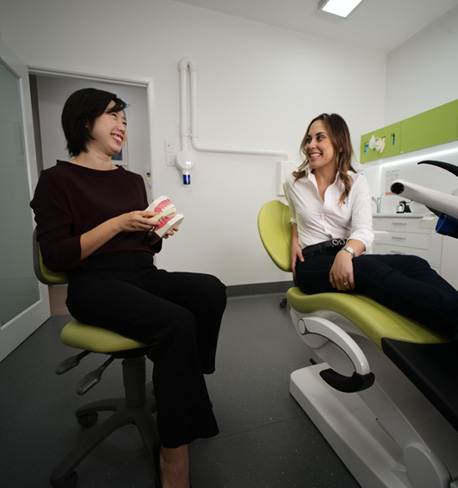
Cracked Teeth
Book a check-up- Home
- Treatments
- Restorative Dentistry
- Cracked Teeth
Cracked Teeth
Cracked Teeth West End
GET HELP TO DIAGNOSE, TREAT AND PREVENT CRACKED TEETH AT MY DENTAL CARE @ WEST END
What is cracked teeth syndrome?
Cracked teeth syndrome is where a crack appears in the tooth which is very hard to identify, even on x-rays. They are most commonly found on your molar teeth as these teeth take on the most pressure.
The symptoms of a cracked tooth include pain when eating or biting food or extreme sensitivity to hot or cold temperatures. This pain is not constant but more targeted on the cracked tooth when eating or biting.
Having a cracked tooth can lead to nerve damage which causes a lot of pain and discomfort. It can cause problems with getting infected as the tooth is open and weakened.
What causes teeth to crack?
It is hard to pinpoint the causes of teeth cracking as most of the time there is no explanation or definite cause. Common suggestions to why teeth cracking occurs are:
- Grinding or clenching the teeth
- Teeth that have large fillings
- Teeth that have had root canal treatment
- Alignment or bite problems leading to too much pressure on one tooth
Your dentist can help you with preventions to teeth cracks, such as mouth guards or dental splints for grinding teeth.
Can cracked teeth heal themselves?
If a tooth has a crack then treatment is needed to prevent any further damage to the tooth or gums. If the crack in the tooth gets bigger there is a possibility that an infection in the tooth or the gum can develop as the tooth has been opened. An examination needs to be carried out by a dentist.
What do I do if I think I have a crack in my tooth?
Most people do not even notice they have a crack in their tooth. This makes it more difficult to diagnose the dental problem. Regular trips to the dentist can help to diagnose this problem as they will be able to examine and carry out tests to check for cracked teeth.
Any questions or concerns about teeth cracks can be answered by your dentist.
What is the treatment for cracked teeth?
There are a variety of options for cracked teeth such as placing a crown on the tooth, performing a root canal or bonding the tooth. In the worse cases, the tooth may need to be extracted if it cannot be fixed.
The treatment you receive will be dependent on your individual situation, such as the location of the cracked tooth and the severity of the crack. This is why it is important to visit your dentist if you think you have a crack in a tooth.
Cracked Teeth West End
At My Dental Care @ West End, we provide a wide range of restorative dental services. Whether you’re looking to have Invisalign, dental implants or anything in between – we’re happy to assist you in any way we can!
Contact us today and take that step towards improving your smile and overall oral health.
All surgical procedures carry risks. Before proceeding, you should seek a second opinion from an appropriately qualified health practitioner.
Frequently asked Questions
Is a cracked tooth always painful?
Not always. Some cracks cause immediate pain, while others may go unnoticed for weeks. Even if you’re not experiencing discomfort, a crack can still weaken the tooth structure. That’s why regular check-ups are important, even small cracks can lead to bigger problems if ignored.
Can a cracked tooth heal on its own?
No, a cracked tooth cannot repair itself. Enamel and dentin don’t regenerate like bone. If left untreated, the crack can spread, potentially leading to infection or tooth loss. Timely dental care is essential to preserve the tooth and prevent more complex issues.
How do I know if I’ve cracked a tooth?
You may not always see a crack, but warning signs often include sharp pain when chewing, sensitivity to temperature, or discomfort that comes and goes. If you’ve recently bitten something hard or felt a sudden sharp twinge, it’s best to book an appointment. Early diagnosis helps avoid further damage.
What causes cracked tooth syndrome?
Cracked tooth syndrome is caused by small cracks or fractures that develop in a tooth’s structure. These cracks can result from various factors, including biting forces, trauma, teeth grinding (bruxism), temperature changes, age-related wear, and habits like biting on non-food objects. Teeth with large fillings or restorations are more susceptible to cracking due to the compromised structural integrity of the tooth. Additionally, rapid changes in temperature, such as when consuming hot and cold foods, can lead to cracks over time. The condition is also more likely to occur as teeth age and undergo wear and tear from years of use. While cracked tooth syndrome can be challenging to diagnose, symptoms such as pain during chewing, sensitivity to temperature, or intermittent discomfort may indicate its presence. Consulting a dentist is essential for an accurate diagnosis and appropriate treatment based on individual circumstances.
What is the best treatment for cracked tooth syndrome?
The appropriate treatment for cracked tooth syndrome depends on the extent of the crack and the symptoms experienced. For minor cracks that don’t involve the pulp of the tooth, dental bonding or the placement of a crown might be suitable to protect the tooth and prevent the crack from worsening. If the crack reaches the pulp, a root canal procedure could be necessary to remove the damaged pulp, clean the tooth’s interior, and seal it to prevent infection. In more severe cases where the crack is irreparable, tooth extraction might be recommended, followed by a discussion of replacement options like implants or bridges. Pain management, changes in habits, and regular dental checkups are also important aspects of managing cracked tooth syndrome. Consulting a dentist is essential to determine the most appropriate treatment plan based on the individual’s situation.
Which teeth are most affected by cracked tooth syndrome?
Cracked tooth syndrome most commonly affects molars, which are the larger, flat teeth located at the back of the mouth. Molars are particularly prone to this condition due to their function in grinding and chewing food, which subjects them to higher biting forces. However, cracked tooth syndrome can potentially affect any tooth. Teeth with larger fillings, previous dental restorations, or those exposed to significant wear and tear are also more susceptible. While molars are often affected, the likelihood of cracked tooth syndrome varies depending on individual factors, habits, and dental history. If you suspect you have cracked tooth syndrome, it’s advisable to consult a dentist for proper evaluation and guidance.

Tooth Coloured Fillings West End
Fill in the online enquiry form to book an appointment. We look forward to seeing you soon. Or call today (07) 3846 2548





